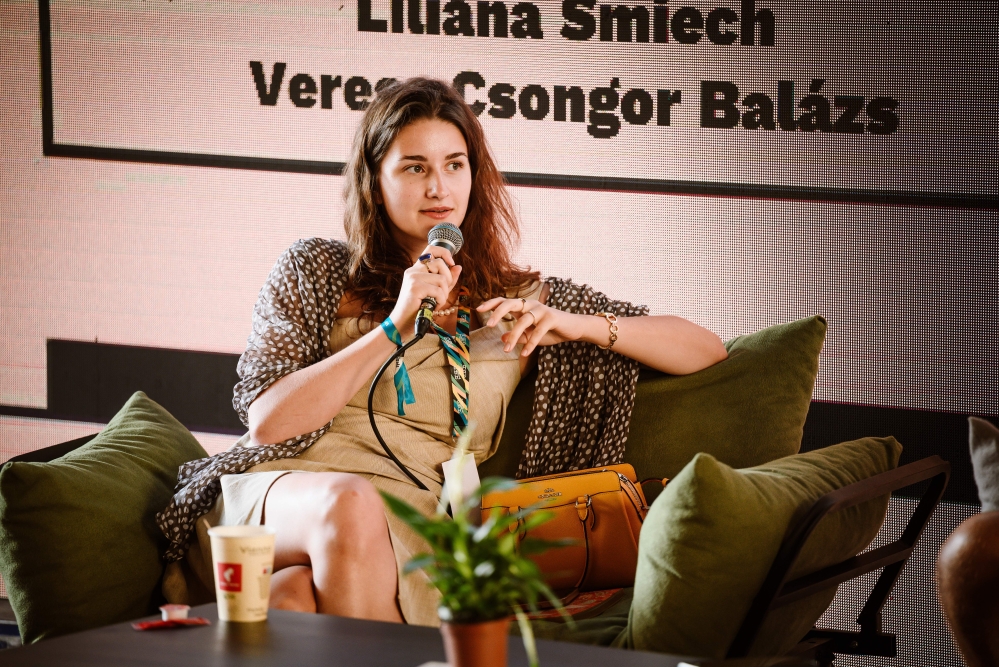Reading time: 3 minutes
Information warfare, hybrid warfare, the impact of propaganda and censorship, and future conflicts were the topics of an interesting discussion on the first day of the Seps Tabakó Festival on 31 August. Liliana Śmiech, Director of the Warsaw Institute and Csongor Balázs Veress, researcher at the MCC Center for Geopolitics, provided a historical perspective, described the current geopolitical situation and outlined the tools of future warfare.
The discussion, titled Information, the Perfect Tool for Modern Warfare, was held in English as part of the daytime programmes organised by Mathias Corvinus Collegium (MCC), and was moderated by Balázs Székely, a student of the MCC University Program from Kolozsvár/Cluj.
Csongor Veress first of all described the generations of warfare:
- in the first generation, there were only battles with masses of people;
- the second, industrial warfare, emerged after the invention of weapons;
- the third was increasingly focused on technology and the use of tactics;
- the fourth generation is characterised by the blurring of the boundaries between war and politics, between combatants and civilians (such as the war against terrorism);
- and some argue that fifth generation warfare is emerging, dominated by non-kinetic military actions such as engineering, disinformation and cyber-attacks, as well as emerging technologies such as artificial intelligence and fully autonomous systems.
Today's conflicts are characterised by hybrid warfare, which means that we are in the fourth era, but we are moving towards the fifth generation. Information is now more important than force itself, said Csongor Veress. But while the big cyber attacks are already in the fifth generation, people are dying in the field in clashes using methods that date back centuries.
On the subject of the Russian-Ukrainian conflict, Liliana Śmiech outlined the Kremlin's efforts to weaken Polish-Ukrainian relations, influence Polish aid deliveries and damage Poland's international image. To achieve this, the Russian side is using a lot of disinformation to emotionally influence and inflame Polish society. One of the best tools is the exploitation of 'useful idiots', such as the misguided Twitter post by former Polish Foreign Minister Radosław Sikorski, the scaremongering article by Greenpeace on Poland's energy dependence, or a university professor who spread Russian propaganda. Misinformation and disinformation were used by the Trojans, but today the speed of information dissemination in the digital media is on a whole new level.
In this information overload, it is difficult to find a middle ground between censorship and the protection of civilians, says Csongor Veress, as it is impossible to examine each case individually, what should be censored and what should be interpreted as free expression. The Russian leadership aims to create discord and uncertainty in Europe and the world. So many different and contradictory narratives are being spread on crucial issues that ultimately people become indecisive and disinterested. For example, during elections, trolls target both sides and flood them with so much misinformation that people end up not voting. Insecurity can lead to a complete disconnection from the issue. The sophisticated methods of trolls spreading fake news were developed by the KGB in communist times: they tell a high percentage of the truth, but weave in falsehood, insert fake news among the believable facts, and thus deceive many.
But how can misinformation be effectively countered? According to Liliana Śmiech, the only way is education, critical thinking and the dissemination of science. It would be a good idea to check everything and be sceptical about viral content, especially if it is too emotional. Her innovative idea is that software like the ones currently warning of a threat to life or a natural disaster could be of use in the future to inform about fake news.
The Tabakó Festival is co-organised by the Sfântu Gheorghe City Hall, Covasna County Council, the Ádám Kónya Culture House, the Komitatus Association, the Mathias Corvinus Collegium (MCC) and the VIBE Festival.



